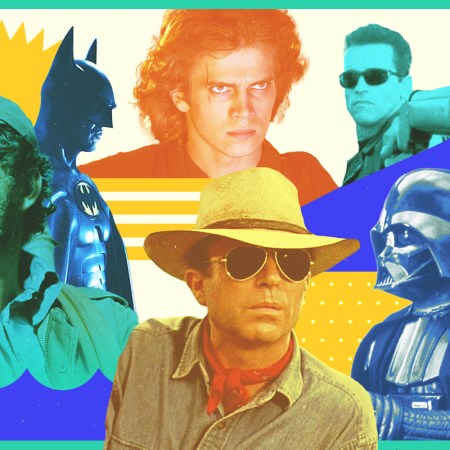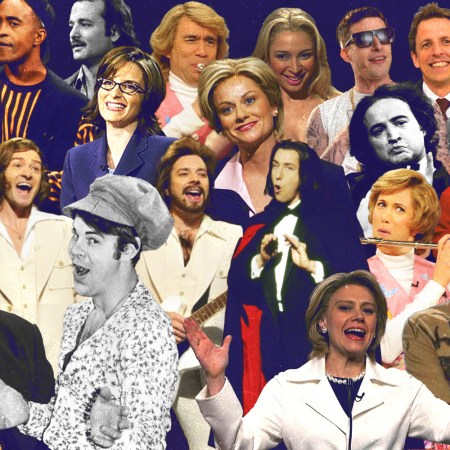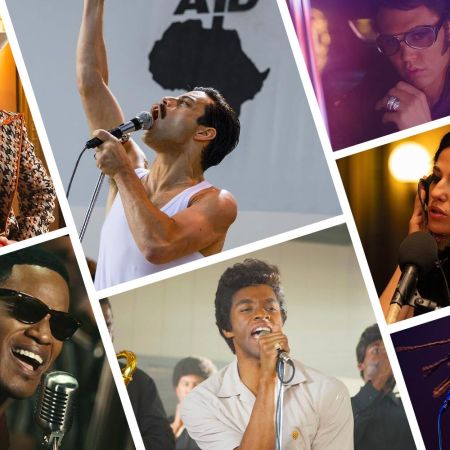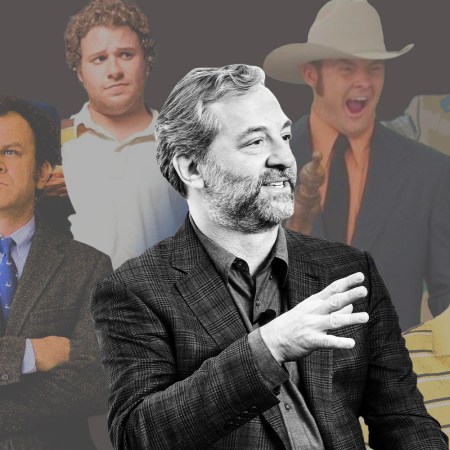
Danny Boyle hasn’t always commanded the same level of respect as other auteurs who burst into cinema during the ’90s and solidified their reputation in the ’00s. (“Despite the Academy Award?” as Trainspotting’s Mark Renton says about Sean Connery.) Part of the reason is probably that his career has a bit of a journeyman quality to it, in the best way: He’s done comedy, romance, thriller, biography, horror, sci-fi and family films — and none of those are his Best Picture winner! But beyond the iconography of Trainspotting, perhaps the surest sign of Boyle’s distinctive voice as a filmmaker is the enduring success of 28 Days Later, his take on the then-moribund zombie genre, such that he has returned to that world this summer for a long-gap sequel. (He’s experienced with that very current-Hollywood skill set, too.) If there’s an errant bag of money, a climax that threatens to drive its hero mad or blood simple, a point-of-view shot with seemingly impossible origins, or a comic interplay between slapstick and violence, there’s a good chance you’re watching a Danny Boyle picture. He comes by his brash, often showy style; unlike a lot of commercial contemporaries who got their start in commercials and/or music videos, Boyle had more old-fashioned origins as a director, working in theater and on television before breaking into features with Shallow Grave. This guide sorts through his entire filmography from that point forward; they’re almost all worth watching. Unlike a lot of the top filmmakers of this era, he consistently makes movies set in the present (or the future), resulting in an up-to-the-minute sensibility that pulses through his best work — and some of his weakest stuff, too. Let’s start there and keep hurtling upwards.
16. Yesterday (2019)
For a guy who didn’t get his start in music videos, Danny Boyle has long had a natural sense for how to incorporate their faster, flashier style into cinema without draining the images in question of their meaning. In other words, he seems like a natural choice to direct a musical. Regrettably, the closest he’s come so far is Yesterday, a Richard Curtis screenplay about a struggling musician (Himesh Patel) who gets dashed on the head and wakes up in a world where the Beatles have never existed. (Finding out what other random cultural iconography has also disappeared from this alternate universe is one of the movie’s better running gags.) Naturally, he winds up passing the Beatles tunes he’s memorized as his own compositions, and whirlwind fame somewhat bafflingly results from there. Unsurprisingly, the most musical sequences are where Boyle fares best; there’s a dynamite little sequence involving the recording of “I Wanna Hold Your Hand” and “I Saw Her Standing There” that hints at the Beatles energy that could have powered the whole thing, a potential full-circle moment with the Beatles homages of Trainspotting (it even uses whooshing trains as punctuation). Instead, the movie too often feels steered by Curtis and his love of sentimental shlock.
15. Vacuuming Completely Nude in Paradise (2001)
After the financial failure of A Life Less Ordinary, mild underperformance of The Beach and critical drubbing of both, Boyle recharged with a couple of back-to-his-roots TV movies. Now, he did make several BBC films before his theatrical debut with Shallow Grave — so why are his 2001-era forays into television included here? Mostly because they feel instrumental in his development as a filmmaker, embracing digital video and a return to the scrappy indie aesthetics that Trainspotting catapulted him out of in a hurry. Vacuuming Completely Nude in Paradise riffs on Arthur Miller and David Mamet with its uncouth door-to-door peddler (Timothy Spall) mentoring a wannabe DJ (Michael Begley). It’s not exactly on the level of the plays it brings to mind, but Spall’s performance is a tour-de-force of unpleasantness and Boyle’s roaming-camera energy is undeniable.
14. Strumpet (2001)
Boyle’s other BBC feature is the second-closest he’s come to a musical after Yesterday, and it’s hard not to imagine how much better that movie could have been with this more adventurous, rough-hewn aesthetic. Strumpet also weirdly pre-visions Once, in that it is about two down-on-their-luck strangers, an eccentric poet (Christopher Eccleston, Boyle’s third-favorite leading man) and a mysterious guitar-playing woman (the apparent pop star Jenna G), who spontaneously make music together in Manchester. The fantasy that they get an instant record deal is more like something from one of John Carney’s weaker films (like Begin Again), though here the unlikeliness is part of the film’s slightly dreamlike yet handmade charm. Even at 72 minutes, it wears a bit thin, but it’s also not a major investment of time if you happen to, say, find it on the internet archive.
13. Shallow Grave (1994)
Boyle’s entry in the first-album-syndrome sweepstakes — what storied filmmaker’s debut can be the most overrated by people who wish they’d make something so simple, uncomplicated and, oftentimes, unchallenging again? — is an admittedly attention-grabbing crime thriller that doubles as a character study of smug young middle-class types. Three sour-spirited friends (Ewan McGregor, Christopher Eccleston, Kerry Fox) search for a fourth person to share their flat, enjoying torturing the various applicants until they find a suitable candidate. But when the guy mysteriously dies and leaves behind a hefty sum of cash, the trio decides to dispose of the body and keep the money, setting off a gruesome chain of events. There’s not much surprise to the film beyond the obligatory switch-up where the quietest and most dignified flatmate turns out to be the most selfish and conniving; mostly, it’s about three bad people getting worse. But Boyle’s flair for depicting the pursuit of cash — a recurring motif in his work — and the beginning of his four-movie partnership with Ewan McGregor make this one worth the watch, if not much nostalgic pining.
12. The Beach (2000)
Boyle and McGregor actually fell out over the casting for this adaptation of an Alex Garland novel when Boyle opted for a post-Titanic Leonardo DiCaprio (i.e., what every filmmaker on Earth wanted at that precise time) to fill the role of a callow young backpacker searching for authenticity. He finds a secret commune on a remote Thai island and, in true Danny Boyle/Alex Garland fashion, nerves and relationships alike eventually fray until someone (that would be our Leo) is running around the jungle like a madman, at one point picturing himself as a video game avatar. The movie semi-inexplicably developed a toxic reputation on the basis of it being merely a solid hit as opposed to Leo’s next blockbuster; it’s also a solid fall-of-paradise adventure thriller, with an admittedly copped-out ending. Still, no disrespect to McGregor but it’s a perfect role for DiCaprio, and Boyle makes the most of his location shooting that makes for a memorable picture even if it threatens to fly off the rails.
11. Trance (2013)
If this twisty post-heist thriller about a thief (James McAvoy) using a therapist (Rosario Dawson) to recover his memories of a stolen painting seems like another back-to-basics reset that brings Boyle closer to Shallow Grave territory, maybe that’s because the original screenplay from Joe Ahearne dates back to around that time. It was made as a TV movie (without Boyle, who saw a draft early on) and then Boyle and frequent collaborator John Hodge rewrote it into a feature nearly 20 years after Grave; the characters aren’t as outwardly antisocial, but a least one turns out to be a particularly nasty piece of work. Trance is undeniably gimmicky; you might even accuse it of being nonsense, at least so far as its psychology is concerned. But Boyle still has the juice for this kind of stylish potboiler, especially when working with easy-fit actors like McAvoy and Dawson.
10. A Life Less Ordinary (1997)
Hear me out. Most people’s pick for one of Boyle’s worst, if not his designated disaster, is this American-set screwball-Coens pastiche starring Ewan McGregor as a self-described “dreamer” (ugh) who, in a moment of desperation, haplessly kidnaps an heiress (Cameron Diaz). She sees an upside to the situation and encourages him to stick with it so they can split the ransom from her self-important and rageful father (the late, great Ian Holm). Oh, and there are angels: Delroy Lindo and Holly Hunter are assigned to make the mismatched couple fall in love. The interplay between these plots is daft and sometimes disorienting, but if you vibe with the movie’s quirked-out sensibility, and can appreciate Boyle’s typically flawless pop soundtrack and some lovely flourishes (McGregor and a nearly tone-deaf Diaz duet on “Beyond the Sea”!), the movie’s loopiness may win you over in the end. Some people will want to turn it off after 15 minutes; others may, I don’t know, watch it 12 or 15 times.
9. 127 Hours (2010)
The only other Danny Boyle picture to score a Best Picture nomination is this seemingly half-forgotten true-life drama about hiker Aron Ralston (James Franco) who goes on a solo walkabout only to get his arm trapped underneath a giant boulder, stranding him for days until he’s forced to conclude that his only way out is, well, something a lot of us would have a lot of trouble forcing ourselves through (or surviving at all). A movie set literally between a rock and a hard place seems like a formal challenge for Boyle, the restless finder of weirdo camera angles and de facto musical numbers, but then again, Ralston does start to hallucinate — a Boyle specialty. Though Ralston’s eventual fate hangs over the movie somewhere between dramatic portent and outright horror, the film really turns on the surprisingly moving spectacle of a seemingly carefree outdoor type forced to take stock of his life — and his future. It’s hard for the uplift to seem phony when the path there is so gnarly.
8. Steve Jobs (2015)
With greater distance, this collaboration between Boyle and screenwriter Aaron Sorkin feels closer to a hagiography than it did in 2015; then and now, it’s subject to unfavorable comparisons to the Fincher/Sorkin tech-guy movie The Social Network, which is a lot more sparing (even if it now seems relatively soft on the empty toolshed that is Mark Zuckerberg). In a way, it feels like a Boyle movie from a different timeline, where he parlayed his Slumdog Millionaire success into more traditionally awards-baiting prestige pictures as a classy Brit for Hire. But having a non-Sorkin director in charge of a Sorkin script always makes the latter more palatable; still witty (and usually still pretty condescending), still rapid-fire, but just not quite as head-over-heels in love with itself as when Sorkin handles the direction. It might seem like faint praise, hailing Steve Jobs as “not directed by Aaron Sorkin,” but it’s also weirdly fun to see Boyle rein himself in and try out a wordier, speechier screenplay than usual for such a kinetic visual stylist. It helps that the wordiness is delivered by Michael Fassbender, Kate Winslet and a surprisingly terrific Seth Rogen; it’s also neat to see a single Boyle movie with 16mm, 35mm and digital cinematography (the texture changes across the movie’s three distinct timelines).
7. Slumdog Millionaire (2008)
It’s still wild to consider that Danny Boyle has an Academy Award for Best Director, while contemporaries like Quentin Tarantino, Paul Thomas Anderson, David Fincher and Spike Lee do not. This isn’t to say that Boyle’s trophy is an insult to any of those filmmakers, or in any way undeserved; just that Boyle was never much of an awards darling until Slumdog Millionaire, and hasn’t been much of one since then, either. His adaptation of a novel about a young man’s hardscrabble upbringing in India told through a scrappy underdog game-show appearance was famously rejected by its original studio until Boyle’s frequent home Fox Searchlight scooped it up and wound up with a global hit and multiple Oscar winner (it scored Best Picture, too). By those standards, and the usual Oscar backlash, the movie is probably destined to underwhelm some latecomers, and the optics of a white British guy directing a story about characters from India would probably play pretty differently if it came out today. But Boyle’s infectious energy, and the pure charm of stars Dev Patel and Frida Pinto, carries Slumdog a long way, and thematically it fits with a number of other Boyle pictures about the pursuit (sometimes literal) of money and success.
6. 28 Years Later (2025)
It’s been six years since Danny Boyle released a feature film, and, if not quite 28 years since his first zombie movie, nearly that. (Plus, the last feature he made was Yesterday, which doesn’t exactly strike one as the most artistically nourishing project. And maybe, come to think of it, counts as a zombie apocalypse of its own?) So it’s natural that 28 Years Later feels, at times, like an omnibus of visual, narrative and thematic concerns that he’s been building up in the years since, making its zombie-movie bona fides perhaps secondary to the winding and sometimes stunning sorta-coming-of-age story he and Garland have cooked up instead. (This movie isn’t much like Millions, but it more closely resembles it more than I would have guessed.) Decades after a “rage virus” devastated Britain (but was beaten back from other countries), 13-year-old Spike (Alfie Williams) lives on a well-fortified island outpost off the coast, with his tough dad (Aaron Taylor-Johnson) and unwell mum (Jodie Comer). A coming-of-age venture onto the mainland to practice his well-honed zombie-killing skills leads to an opening up of his world, and Boyle hasn’t lost a bit of his visual acuity, and lends this post-apocalyptic horror movie some dark-fairy-tale flourishes — a more verdant iteration of the first film’s pioneering digital cinematography. Between this and the film in the next spot, Boyle has become an unexpected master of the long-gap sequel.
5. T2 Trainspotting (2017)
Perhaps the most undervalued movie in Boyle’s filmography accompanies the movie that remains his calling card after all these years. The cheekily titled T2 sequelizes Trainspotting, and while novelist Irvine Welsh did so himself much earlier via the 10-years-later novel Porno, the film doubles the distance from the original to 20 years and modifies a lot of the material to fit the boys’ further descent into middle age. Though it repped McGregor and Boyle’s first collaboration in decades, T2 is more of a true ensemble than its predecessor, with near-equal time afforded Renton (McGregor), Sick Boy (Jonny Lee Miller), Spud (Ewen Bremner) and Begbie (Robert Carlyle) — maybe a bit too much Begbie, to be honest. But the movie’s reflection on the passage of time, the sometimes-hollow yet irresistible allure of nostalgia and the loss of youth all hit hard, often with dazzling technique crossing Boyle’s later-period digital work with the brash energy and dreamlike touches of the celluloid-shot original. All in all, it’s one of the best and smartest legacy sequels of this neverending nostalgia cycle we seem to be trapped in.
4. 28 Days Later (2003)
The film that launched a thousand zombie projects still looks a bold, singular vision today. With the passage of time, the early digital cinematography from the wizardly Anthony Dod Mantle has somehow maintained its consumer-grade immediacy while now evoking a particular early-2000s time and, in certain scenes, looking painterly in its smeary pixelation. Boyle could be accused of being a sensation-driven director, which might explain why he was able to revive a horror subgenre with the most striking zombie movie since the prime Romero years. The hook is a grabber: a bike messenger (Cillian Murphy) wakes up from a severe hospital stay to find that London, and the rest of Great Britain, has fallen around him. The usual odyssey through a ravaged landscape with a small group of survivors follows, but even zombie-movie clichés (the kindly father figure who gets bit — or, here, infected; the humans whose chosen cruelty threatens to overshadow the more literal monsters) have a turbo-charged, nerve-rattling immediacy. Culturally, it was deeply influential, yet stylistically, not much has come close.
3. Sunshine (2007)
Garland and Boyle reteamed not for the first 28 Days Later sequel, but for a sci-fi-horror-adventure that came out a few months after said sequel. The plot sounds like several big Hollywood disaster movies: A spaceship crew heads out to launch a nuclear blast designed to re-ignite our dying sun and preserve life on Earth. But this isn’t Armageddon, or Deep Impact, or any of those, but a thoughtful, sometimes psychedelic, often terrifying journey into a heart of darkness for an all-star crew that includes Cillian Murphy, Michelle Yeoh, Rose Byrne, Chris Evans, Cliff Curtis and Benedict Wong. Though Boyle was a digital acolyte at this point, he chose to stick mostly with film for this one (including some sequences shot on 65mm), and the result may be his most purely beautiful film, and a stunning contrast with the very different beauty of 28 Days Later. Regardless, the two films feel like companion pieces in how they reinvent familiar genre narratives as questions about how we maintain our humanity and our relationship with the natural (or, in this case, largely unknown) world(s).
2. Millions (2005)
What if the maniacs typically chasing a large sum of cash around at the climax of multiple Danny Boyle movies invaded a family film? That’s more or less what happens when a pair of brothers (Alex Etel and Lewis Owen McGibbon) stumble upon a bag full of cash thrown from a moving train. Before the shady men show up looking for it, the brothers, grieving the loss of their mother, use their windfall in very different ways, a contrast that sets the whole movie apart from the kid-gets-money fantasies of various ’90s wish-fulfillment comedies. Even 20 years after its release, Millions remains a relative rarity in its field: A live-action movie about kids, with a kid-friendly storyline, that doesn’t condescend to a younger audience or make an older one suffer through dumb shtick and is actually about something, in this case the pursuit of goodness. The movie’s whimsical touches, like the younger brother having an encyclopedic knowledge of (and sometimes conversations with) saints, are all rooted in an emotional reality, to the point where this extremely sweet-natured and often funny movie is also, for a particular scene toward the end, one of the century’s great tearjerkers so far.
1. Trainspotting (1996)
It feels a bit like rating Goodfellas as Scorsese’s best: Obvious, but inevitable. Boyle and his frequent screenwriting partner John Hodge adapted Irvine Welsh’s novel about Scottish junkies into a propulsive black comedy that doesn’t skimp on the tragedy interlaced with its quartet’s heroin-and-booze-fueled misadventures. Boyle often seems to be underlining a bit from Renton’s narration about heroin and the sheer pleasure of it, pointing out that, after all, if it didn’t feel amazing, they wouldn’t be neglecting everything else in their lives to do it. Trainspotting acknowledges that pleasure with its rush of Beatlemania-referencing, dream-sequencing, head-rushing, montage-paced junkie antics, leading to predictable contemporaneous accusations of glamorizing drug abuse. But as charismatic as Ewan McGregor is in his breakout role, it’s more that the movie deglamorizes everything else about life in Edinburgh, making clear the workaday dreariness that Renton and the boys are escaping, whether through drugs, alcohol or wanton violence. Through his film’s momentum and accompanying memorable images of bodies in motion, Boyle is able to make the film’s episodic back-and-forth between semi-sobriety and drugged-up highs, between moral lows and amoral kicks, flow almost criminally well. (As good as T2 Trainspotting is, it’s telling that none of that film’s bits of backstory found their way into the first movie where they would have made more technical sense but slowed down the heedless, destination-less forward thrust.) As Pulp Fiction was to certain American filmmakers of the ’90s, Trainspotting was to their British counterparts; Guy Ritchie has spent decades trying to make a movie anywhere near this great. Boyle, meanwhile, spent subsequent years hopscotching through genres and tones with the same gleeful energy of his most forever-famous movie.



